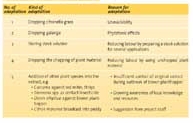Gabriele Stoll
Natural Crop Protection in the Tropics
Letting Information Come to Life
Letting information come to life
|
|
||
|
Developing Insect -Controlling
Plants with Farmers
|
|
|
|
|
 |
|
Letting information come to life
Developing Insect-Controlling Plants with
Farmers
Pioneering participatory research in
Thailand
by Gabriele Stoll PhD, Withoon
Lianchamroon,
Phayong Srithong
Background and context
This project already dates back 10 years.
However, the approach chosen and experiences made are still
valid today and worthwhile to be shared.
It was initiated because in many
development projects there was an interest in non-chemical crop
protection methods. However, information was difficult to
access or, where it could be accessed, it was written in a
scientific language which was difficult to translate into field
language. In the meantime, access to information on natural
crop protection methods has increased considerably, information
which derives from traditional and locally-generated knowledge
as well as scientific knowledge.
Today, a basic knowledge of natural crop
protection practices has been established in Thailand to which
the ACPP (Aternative Crop Protection Project) has contributed
considerably. However, the growing potential for organic
products for both domestic and export markets demands high
quality crops which are not yet produced at large scale due to
lack of an adequate training and extension system. The approach
and experiences of the ACPP combined with developments at
international level could contribute to strengthen the emerging
organic farming sector in Thailand.
The project
The ACPP was a joint project between two
NGOs, the Appropriate Technology Association (ATA) based in
Bangkok, later TREE based in Suphanburi in Central Thailand,
and the McKean Rehabilitation Center in Chiang Mai, North
Thailand. At ATA, the ACPP worked through their Integrated
Farming System Project, with TREE through their Natural Crop
Protection Project and with the McKean Rehabilitation Center
through their Organic Farming Demonstration Project.
By working through existing projects and
grown structures, the ACPP did not act isolatedly in the
contact villages. However, this required a good cooperation and
fine-tuning of both approach and activities with the 'mother
projects' so that the farmers would perceive the additional
activities of the ACPP as part of one whole concept. Farmers
were quite open to the new cooperation.
The project objectives were:
• To generate and improve know-how on
preparation, application and control effects of plant-based
extracts under farmers' conditions.
• To integrate scientific know-how
and scientists into a farmer-participatory approach to generate
natural crop protection practices, particularly plant-based
extracts.
• To elaborate a participatory
on-farm experimentation methodology and to disseminate this
among local and foreign development workers and the
organizations they work with.
•To disseminate the use of
plant-based extracts to farmers and interested development and
extension workers.
What was the implementation strategy?
Based on its objectives, this project was
very complex from the outset. The responsible people in the
project viewed themselves primarily as facilitators for a
specific task who were incorporating advice from local
specialists of different disciplines.
Process of adaptation of neem-based plant
extracts
The printed version contains more
information about the following themes:
Motivations and expectations of farmers
Research approach, methodology,
management, output
Roles and responsibilities
Vertical and horizontal linkages
Assessment
